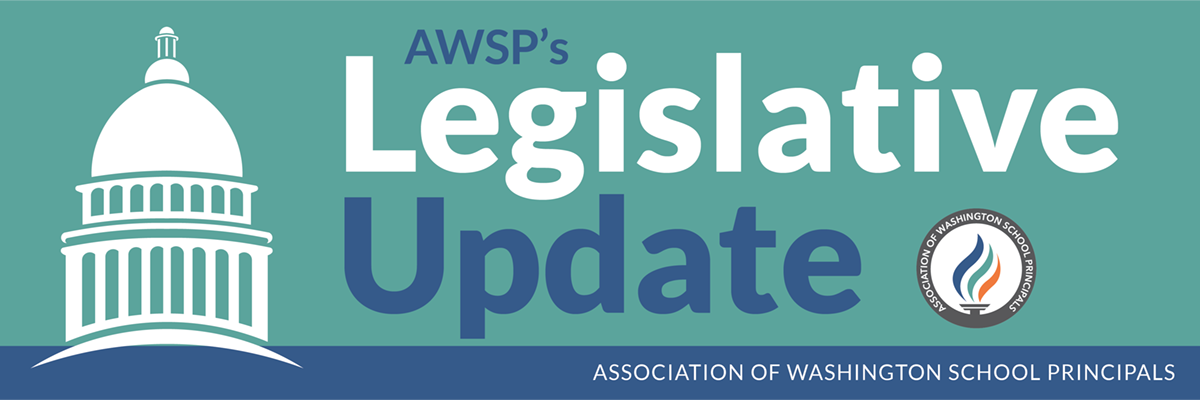
One Hurdle Cleared
 Colorado State University student Drew Thompson clears hurdles.
Colorado State University student Drew Thompson clears hurdles.
We cleared the first big hurdle of this year’s legislative session this week when bills had to pass out of their policy committees. Bills with fiscal implications must pass out of House Appropriations or Senate Ways and Means by February 5. The next step after that is for bills to be passed off the floor of the House or the Senate and the deadline for that is February 13. After that, the bills move to the other side and the process repeats.
Bills and Budget
My bill tracking list got a lot smaller this week which is good news. Some of the policy bills that remain in play include substance use prevention education on fentanyl (
HB 1956/
SB 5923), establishing a statewide network for student mental and behavioral health (
SB 6216), and restraint and isolation (
HB 1479). The restraint and isolation bill was updated with revised language for some terms and to allow a little more flexibility for schools to use waivers. It also added regional behavioral specialists and some reporting requirements. Much more conversation is coming with this bill as it heads toward the House floor for a vote. We aren’t sure what kind of appetite the Senate has for this bill this session but the Senate version did not move out of the Early Learning and K-12 Education Committee.
There are also several bills related to updating curriculum requirements including computer science (
SB 5849), financial literacy (
HB 1915), Holocaust and genocide education (
HB 2037), and mandating instruction on the Pledge of Allegiance (
SB 6205). There is an effort to support high school students through bills such as ninth grade success grants (
HB 2052), paying for AP/IB exams (
HB 2326), adding private non-for-profit colleges to College in the High School (
HB 2441), increasing student navigational support for postsecondary preparation (
SB 6254), and strengthening CTE Core Plus programs (
HB 2236).
There are several bills related to our educator workforce including dual language programs (
HB 1228), teacher residency programs (
HB 1565), and phasing in additional staff allocations for teaching assistants, office support staff, and non instructional aides in the prototypical school funding model (
HB 1960/
SB 5882). Related to paraeducators, there is a bill that would increase compensation for this group (
HB 2380/
SB 6082).
As the fiscal committees now begin to seriously consider the many policy bills that remain, they will have to decide what they truly value and whether they will commit to funding these policies. If the bill related to restraint and isolation practices continues to move, how much funding would be provided for professional learning? If the bill related to paraeducator compensation moves forward, will it be a $7/hour increase or might that be decreased as budget priorities change and settle?
In further budget news, districts have organized efforts to point out how underfunded MSOC (materials, supplies and operating costs) has been over the past few years as the state has not kept up with the rising costs of insurance, utilities, curriculum, and more. The state needs to fully fund district costs for MSOC, special education, or transportation to name three big areas. Education advocates are pushing on legislators to do more with the state budget to support K-12 schools.
We continue to ask legislators to include two specific budget asks that our partners at OSPI included as a decision package request to Governor Inslee. The Governor did not include these requests in his budget, so we are asking legislators to include them in the final supplemental budget.
Our first request is an enhancement to our state’s principal internship program. Currently, funding is available to cover only 8-10 substitute days for interns receiving this grant. This is not sufficient preparation. We are asking for an additional one million dollars so grant recipients can have at least 25-30 days covered.
The second item is for $860,000, which allows OSPI to partner with us and provides more secure funding and support for associate director positions. These positions support principal professional learning, respond to member support calls, and provide coaching. They also support ongoing work related to instruction, evaluation, behavior, mental health, and more.
As a member of the School Funding Coalition, we continue to work alongside other statewide associations, like WASA and WSSDA, to urge legislators to update the prototypical funding model for principals and other staff. We thank Representative Alicia Rule for sponsoring
HB 2212, which would update the ratio for building administrators. Even though this bill failed to get a hearing, it is good to have language to point to as we talk about the workload of principals and one idea to help alleviate some burdens.
Here is my
complete bill tracking list if you’d like to check out all of the bills.
Engage in Advocacy
February is our “Member Engagement Month” and there is no better way to engage with your professional association this month than by getting involved in our advocacy efforts. There are a variety of ways in which you can do this. Some take a few seconds, and some take a little more time. Choose your own level of engagement, but please do take action to support legislation that would help “Grow, Support, and Sustain” our current and future school leaders.
Send a Quick Action Alert
This is the easiest option of all. Here are links to two quick action alerts that will send an email to your legislators after you enter your own name and address. The first one is to request support for a budget proviso that would add more funds to the principal intern grant and to provide regional support for current building leaders. The second one allows you to write your own message. Try these now…they are so easy! Scroll down the page until you see the Action Alert you would like to send.
Be a Principal Partner with a Legislator
If you would like to commit to communicating more regularly with your legislators, let me know. Email me if you would like to be a “Principal Partner with a Legislator”.
Invite Your Legislator to be the “Principal for a Day”
We had a very successful pilot project a few weeks ago when Senator Claire Wilson shadowed Principal Terrie Garrison at Fir Grove Elementary in Puyallup and when Representative Clyde Shavers shadowed Principal Jenny Hunt at Broad View Elementary in Oak Harbor. We plan to hold this event again in October, 2024. If you would like a legislator to shadow you next fall, send me an email.
Meet with Your Legislators
It’s really easy to set up meetings either in-person or via Zoom with your legislators. They should prioritize meeting with you because you are their local constituents. Here is a link for their contact information and it’s also helpful to include their legislative assistants in your email to request a meeting. It’s possible to meet with them now during the legislative session but it will probably be a short 15 minute conversation. During the interim, they should have more time to meet with you. Either option works because it’s all about developing a working relationship with our policymakers.
Participate on our Advocacy Advisory Council
We have over 50 principals and assistant principals who belong to our AWSP Advocacy Advisory Council. During the legislative session, we meet weekly on Zoom to discuss the bills being heard that week and to strategize about how we, as an association, will respond. This group of people is invited to attend our annual “AWSP Day on the Hill” which will be held on Monday, February 5th. During the interim, we meet occasionally via Zoom to stay in touch about various issues, meet with legislators about bills that they are considering, and develop our legislative platform. Email me to get involved at this level.
Shadow Me for the Day
Last week, it was a first for me and an absolute joy to have Principal Lisa Kusche from Ballou Junior High in Puyallup, spend the day with me at the Capitol. Lisa participated with me in all of my usual advocacy and committee meetings with other education stakeholders and legislators. It was so great to have her here (and I’m so bummed that I forgot to take a selfie of us!) Email me if you would like to hang out sometime in Olympia.
Below are additional links to find out more about these bills and to contact your own legislators. Legislators care very much about hearing directly from their constituents. When we weigh in as an association, it is helpful and important, but having many of you reach out directly with a short email to legislators can be much more powerful.
Important Links:
Other Advocacy Efforts
Day on the Hill
Many of our Advocacy Advisory Council and AWSP Board Members are planning a visit to Olympia on
February 5 for our annual “Day on the Hill”. They will be meeting with their own legislators and perhaps attending some committee hearings. You can get involved by scheduling a virtual meeting with your own legislators that week. See the links shared above to find your district legislators and their email addresses.
Here is my complete bill tracking list for this week.
Get Involved
Many thanks for all that you do for students and staff.
Please reach out if you have questions or comments. Thank you!
